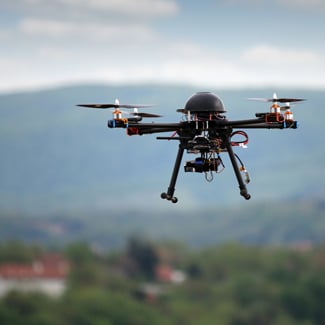Firms bet on growth potential of drone law

Image from Shutterstock.
For most people, unmanned aircraft systems—aka drones—are only slightly more popular than Ebola. That’s because when most people think of a drone, they think of the army using video-game controls to fly a sophisticated aircraft that can travel through airspace without being detected while boasting enough firepower to incinerate a target in any city in the world.
That’s not the case at law firms. Recognizing the huge potential growth of using drones for nonfatal purposes, several firms, including giants like Kramer Levin, LeClairRyan, and McKenna Long & Aldridge, have launched practice groups in the past year specializing in unmanned aircraft systems. In October, both Hogan Lovells and Morrison & Foerster announced new UAS groups.
“For a long time, people have thought of drones as military machines,” says Brendan Schulman, a special counsel at Kramer Levin who heads the firm’s UAS group. “But that perception is changing because of news coverage on drones doing package delivery, cinematography, search and rescue, and safety inspections.”

Photo of Victor Li by Saverio Truglia.
According to Schulman, the idea for the group came about after Kramer Levin represented Raphael Pirker after he was fined $10,000 in 2011 by the Federal Aviation Administration for flying a model airplane with a camera attached around the University of Virginia. The FAA claimed Pirker, who was collecting aerial shots for a promotional video for the university, violated the rule against operating unmanned aircraft vehicles for commercial purposes. Pirker appealed the fine and won a significant victory in March when a National Transportation Safety Board judge found the FAA had no authority to regulate the use of small model aircraft. The ruling, which the FAA appealed to the rest of the board the following month, has complicated the legal landscape and could force the agency to speed up its rulemaking process concerning use of commercial drones.
Given the myriad legal issues involved in defending Pirker, as well as drones as a whole, Schulman figured his firm could use a full-time UAS practice group. While UAS mainly touches on aviation law (most lawyers in the field have some type of aviation law background), drones also present privacy, constitutional, criminal, First Amendment, environmental and intellectual property questions. “For clients developing and operating this technology, there are many different legal challenges because of the changing legal landscape,” Schulman says. “That really calls for multidisciplinary approach.”
Mark Dombroff, an aviation law partner who is co-chair of McKenna Long’s UAS group, however, stresses that drone use, at its base, is an aviation industry issue. As such, Dombroff believes it is vital for clients to choose lawyers that have extensive aviation law experience—especially when it comes to dealing with the FAA.
“What clients have to understand is that the FAA is regulating UAS and will continue to do so comprehensively,” Dombroff says. “I think it will hit home when the FAA releases its notice of proposed rulemaking. If you are going to operate an aircraft, which a drone is, then you will have to meet certain requirements. That’s true if you are a hobbyist, or if you’re doing it for commercial purposes.”
In that respect, most of Dombroff’s clients so far are companies seeking exemptions from the FAA in order to operate drones for commercial purposes, as well as to perform potentially dangerous tasks such as safety inspections. “I don’t think we’ll see the FAA approve the delivery of packages anytime soon, certainly not in the next two to three years,” he says, referring to Amazon.com, which hopes to start testing drones subject to an FAA exemption.
Indeed, until the FAA acts decisively, a lot of companies and individuals are flying blind when it comes to commercial or private-use drones.
LeClairRyan shareholder Tim Adelman, who heads the firm’s UAS practice, points out that there are thousands of model aircraft and drones available at hobby shops that are not compliant with FAA safety standards.
“The FAA does not have the resources to police them,” Adelman says. “And they’re popular because they are much cheaper. … From a safety standpoint, there’s no difference in the type of harm they can cause compared to a more sophisticated drone.”
Victor Li writes the LawScribbler column for the ABA Journal. You can follow him on Twitter at @VictorLi_ABA.



